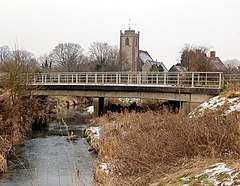Human settlement in England
| Long Itchington | |
|---|---|
 River Itchen bridge, Long Itchington River Itchen bridge, Long Itchington | |
 | |
| Population | 2,013 (2011 Census) |
| OS grid reference | SP420653 |
| Civil parish |
|
| District | |
| Shire county | |
| Region | |
| Country | England |
| Sovereign state | United Kingdom |
| Post town | SOUTHAM |
| Postcode district | CV47 |
| Dialling code | 01926 |
| Police | Warwickshire |
| Fire | Warwickshire |
| Ambulance | West Midlands |
| UK Parliament | |
| |
Long Itchington is a large village and civil parish in Warwickshire, England, which at the 2011 Census had a population of 2,013. The village is named after the River Itchen which flows to the south and west of the village. Long Itchington is around two miles north of Southam on the A423 road, just north of the Grand Union Canal.
The focal point at the centre of the village is a village green with a pond. Long Itchington is mostly made up of 20th century developments, but includes several historic buildings, including a half-timbered Tudor house on the main road at which Queen Elizabeth I is said to have stayed in 1572 and 1575. The old Manor House in the square dates from the 15th century.
The village church of Holy Trinity originates from the 1100s, with later additions. It is a grade II* listed building. St Wulfstan, is said to have been born in Long Itchington in around 1012. He became Bishop of Worcester in 1062. Another notable born in the village is the journalist Tom Hilditch.
The village has long had an involvement in the cement industry. Just south of the village was a cement works and quarry. The cement works is now closed, but quarrying at the site still continues. Opposite the old cement works a little way from the main village is a small model village, which was originally built to house the cement workers.
The village was once served by the former Weedon to Leamington Spa railway line. The village station, Southam and Long Itchington railway station was to the south of the village on the road towards Southam, and closed to passengers in 1958, although the line to the cement works continued in operation for goods trains until 1985. Part of the old railway line has been converted into a cycleway as part of the National Cycle Network.
In October 2018, a war memorial was erected to commemorate the 54 men of the village who were killed in the First World War. The parish includes the hamlet of Bascote.
Amenities
The village contains seven pubs, a diner, a small shop, a Co-op small supermarket, a church, a Congregational chapel, a nursery, a primary school, a hairdressers, a park with skate ramp and a community centre.
Gallery
-
 Tudor house in Long Itchington, Queen Elizabeth I is believed to have stayed here
Tudor house in Long Itchington, Queen Elizabeth I is believed to have stayed here
-
 Holy Trinity Church
Holy Trinity Church
-
 Duck pond on the village green
Duck pond on the village green
References
- "LONG ITCHINGTON Parish in West Midlands". City Population. Retrieved 14 September 2020.
- "Long Itchington Village Green and Pond". Our Warwickshire. Retrieved 14 September 2020.
- "About Long Itchington". Long Itchington Parish Council. Retrieved 28 December 2021.
- ^ Warwickshire Towns & Villages, by Geoff Allen (2000) Page 82 ISBN 1-85058-642-X
- "Holy Trinity Church, Long Itchington". Our Warwickshire. Archived from the original on 12 August 2020. Retrieved 14 September 2020.
- "Church of the Holy Trinity A Grade II* Listed Building in Long Itchington, Southam, Warwickshire". British Listed Buildings. Retrieved 14 September 2020.
- "Southam Cement Works". Our Warwickshire. Retrieved 14 September 2020.
- "Southam & Long Itchington Station". Warwickshire Railways. Retrieved 14 September 2020.
- "Village gets memorial to WW1 dead". BBC News. 27 October 2018. Retrieved 28 October 2018.
External links
- Long Itchington Parish Council
- Long Itchington Archives - Our Warwickshire
| Ceremonial county of Warwickshire | |
|---|---|
| Boroughs or districts | |
| Major settlements (cities in italics) | |
| Rivers | |
| Canals | |
| Topics | |
